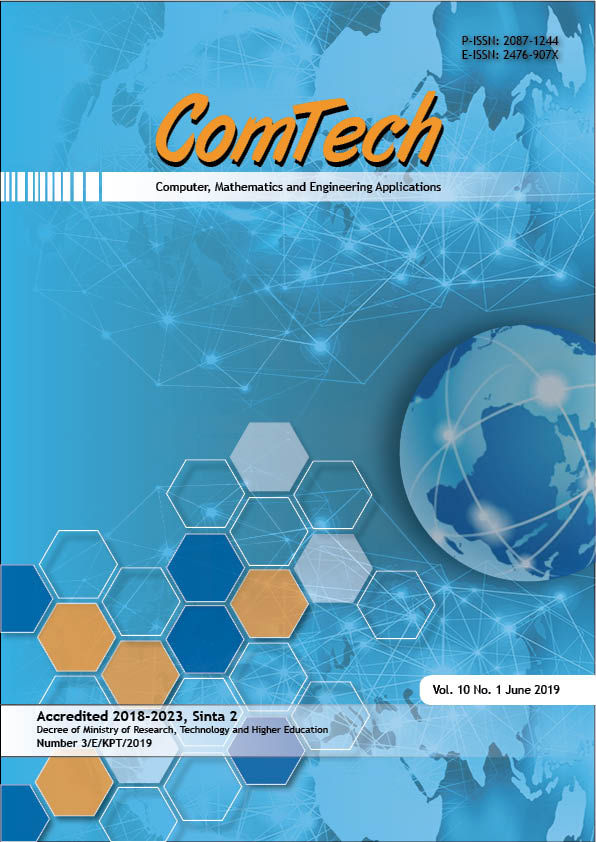Expert System Development for Course Enrollment Process Using Ripple Down Rules in a University in Surabaya
DOI:
https://doi.org/10.21512/comtech.v10i1.4962Keywords:
expert system, course enrollment, Ripple Down Rules (RDR)Abstract
The research aimed to develop expert system for helping lecturers to decide which courses to be taken by students in the next semester. The expert system contained specific pieces of knowledge to solve specific problems involved in the forms of system development and maintenance. This expert system was in the form of a website using the PHP programming language and MySQL database. The researcher used the Ripple Down Rules (RDR) method to identify the courses by putting forward the questions so that the system could decide which courses the students should take in next semester. The result shows that this web-based expert system can identify which courses that the students have to enroll after the students have answered questions generated by the system. The available data on the courses in the system adapt to the rules, so it is in line with the enrolled courses.
References
Anam, S., Kim, Y. S., Kang, B. H., & Liu, Q. (2015). Schema mapping using hybrid ripple-down rules. In 38th Australasian Computer Science Conference (ACSC 2015) (Vol. 159, pp. 17-26).
Bratko, I. (2001). Prolog programming for artificial intelligence. Pearson Education.
Durkin, J. (1994). Expert systems: Design and development. New York: Macmillan.
Galgani, F., Compton, P., & Hoffmann, A. (2015). Lexa: Building knowledge bases for automatic legal citation classification. Expert Systems with Applications, 42(17-18), 6391-6407.
Han, S. C., Mirowski, L., Jeon, S. H., Lee, G. S., Kang, B. H., & Turner, P. (2013). Expert systems and home based telehealth: Exploring a role for MCRDR in enhancing diagnostics. In International Conference, UCMA, SIA, CCSC, ACIT 2013 (Vol. 22, pp. 121-127).
Han, S. C., Yoon, H. G., Kang, B. H., & Park, S. B. (2014). Using MCRDR based agile approach for expert system development. Computing, 96(9), 897-908.
Hussain, M., Hassan, A. U., Sadiq, M., Kang, B. H., & Lee, S. (2018). Missing information prediction in ripple down rule based clinical decision support system. In International Conference on Smart Homes and Health Telematics (pp. 179-188).
Patrzek, J., Sattler, S., van Veen, F., Grunschel, C., & Fries, S. (2015). Investigating the effect of academic procrastination on the frequency and variety of academic misconduct: A panel study. Studies in Higher Education, 40(6), 1014-1029.
Richards, D. (2009). Two decades of ripple down rules research. The Knowledge Engineering Review, 24(2), 159-184.
Shirazi, H., & Sammut, C. A. (2008). Acquiring control knowledge from examples using ripple-down rules and machine learning. Iranian Journal of Science and Technology, 32(B3), 295-304.
Zeenath, S., & Orcullo, D. J. C. (2012). Exploring academic procrastination among undergraduates. International Proceedings of Economics Development & Research, 47(9), 42-46.
Downloads
Published
How to Cite
Issue
Section
License
Authors who publish with this journal agree to the following terms:
a. Authors retain copyright and grant the journal right of first publication with the work simultaneously licensed under a Creative Commons Attribution License - Share Alike that allows others to share the work with an acknowledgment of the work's authorship and initial publication in this journal.
b. Authors are able to enter into separate, additional contractual arrangements for the non-exclusive distribution of the journal's published version of the work (e.g., post it to an institutional repository or publish it in a book), with an acknowledgment of its initial publication in this journal.
c. Authors are permitted and encouraged to post their work online (e.g., in institutional repositories or on their website) prior to and during the submission process, as it can lead to productive exchanges, as well as earlier and greater citation of published work.
 USER RIGHTS
 All articles published Open Access will be immediately and permanently free for everyone to read and download. We are continuously working with our author communities to select the best choice of license options, currently being defined for this journal as follows:
























